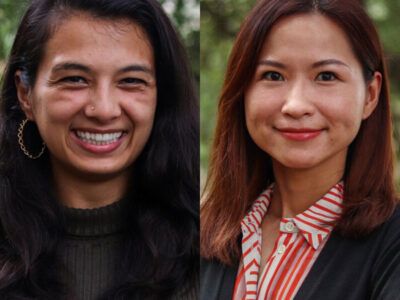SHS doctoral candidates Cat Wilsnack and Amy Pei-Lung Yu have been awarded a University Continuing Fellowship for the 2024-2025 academic year, marking the fifth consecutive year that multiple students nominated by SHS have been selected for this highly competitive fellowship.
Awarded by The Graduate School to doctoral students who demonstrate a well-defined program of research and an exceptional record of accomplishments while enrolled at UT Austin, University Continuing Fellowships include a 12-month stipend, health insurance assistance and tuition assistance that pays the cost of in-state tuition. Each doctoral program at UT is permitted to nominate two students for this award each year.
“The students of The Doctoral Program in Social Work have proven time and again that they are exceptional scholars,” said Dr. Yessenia Castro, Associate Professor and Associate Dean for Doctoral Education at SHS. ” “The award is among the most competitive one at the University, and this marks the fifth consecutive year that both students nominated by the Steve Hicks School have been selected for it. Cat Wilsnack and Amy Yu are two incredible and well-deserving doctoral students for this honor, and I continue to be excited about how they will change the world with their work.”
Wilsnack, who earned her B.S. in Psychology from the University of North Carolina at Chapel Hill and a Master’s in Social Work from the University of Pennsylvania’s School of Social Policy and Practice, carries research interest in oncology, cancer genomics, rare disease, end of life and palliative care, caregiver support, aging, grief, loss, and family bereavement. Prior to matriculating, she completed a Cancer Research Training Award Fellowship at the National Institutes of Health in the National Cancer Institute. As a clinically informed, community-engaged participatory researcher, Wilsnack seeks to identify and address health disparities among underserved populations in psychosocial oncology. She has developed partnerships with various patient advocacy groups and patient advisory boards at major cancer centers have allowed her to thoughtfully engage with these populations and co-create a research agenda that: 1) identifies and addresses the unmet psychosocial needs of cancer patients and survivors that contribute to health disparities and 2) characterizes determinants of access to psychosocial care that help generate population-specific interventions.
Her dissertation will be a mixed methods study that examines psychosocial health at the intersection of substance use and cancer. The quantitative portion will analyze 20 years of data from the public-use National Health Interview Survey-Linked Mortality Files to examine how race/ethnicity and psychosocial variables predict survival among cancer survivors who engage in problematic substance use vs those who do not. The qualitative portion will aim to describe the lived experiences of cancer survivors who developed a substance use disorder (SUD) following their cancer diagnosis and characterize their healthcare experience from point of diagnosis through survivorship, identifying barriers and facilitators to population-specific care, and ascertaining the risk factors and protective factors for developing a SUD.
Yu, meanwhile, has extensive international interprofessional experience in evidence-based program development, cultural adaptation, and supporting the multifaceted needs of individuals with intellectual and developmental disabilities (IDD) who live in institutions and with their families. Informed by her practice and research experience, Amy’s program of research focuses on supporting racially and ethnically minoritized families of individuals with IDD across the life course, with a particular interest in exploring the support dynamics among multiple caregivers.
Currently, Amy serves as one of the lead graduate research assistants for a large 3-study multi-site project that focuses on promoting the health and wellbeing of Latinx families of children with IDD. She leads and coordinates the UT assessment team, and has co-developed the intervention curriculums, training, manuals, intervention protocols, and program evaluation tools for both the pilot study and randomized controlled trial.


